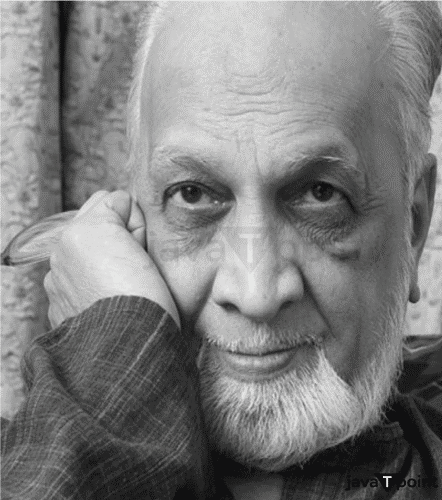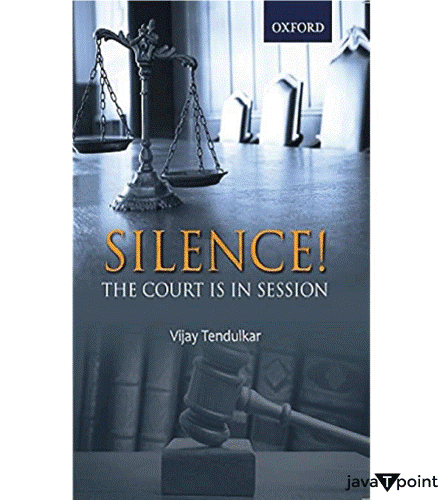Silence! The Court is in SessionAbout AuthorKolhapur, a city in the west Indian state of Maharashtra about 200 miles south of Mumbai, is where Vijay Tendulkar was born. Tendulkar left school at the young age of 14 to take part in the Indian independence struggle. Tendulkar continued to enjoy writing and reading even though he was no more in school. He started working for newspapers, frequently writing as a social critic who defended those who were less fortunate. He also penned plays, and while his first two received little notice from the audience, his third piece, Srimant, was both more well-liked and more contentious. Throughout his lifetime, he produced scores of plays, one-acts, screenplays, translations, journalism pieces, short tales, literary essays, and books. 
Plot SummaryLeela Benare arrives at the little Indian village's gathering hall where she and a small number of co-workers will present a Living Courtroom to the locals. While they wait for the other members of the group to show up, Benare appears early with a local villager name Samant, who assists her in opening the building and speaks with her. Unmarried and recently pregnant, Benare is a secret to her co-workers and the audience. Additionally, she lost her job as a school teacher because her employers were concerned that her pregnancy was an indication of immoral behavior that she might pass on to the kids. At the meeting hall, a bunch of people arrived, the people were Rokde, Sukhatme, Ponkshe, Mr. Kashikar, and Mrs. Kashikar, Karnik. But Prof. Damle and Mr. Rawte, 2 troop members, were unsuccessful to attend the performance. Despite the fact that they have worked together for years, every member of the group is always criticizing the others and trying to overpower them. 
The troop mates decide to arrange a trial while they wait as they still have a few hours before their performance is scheduled. Sukhathe plays the character of a lawyer, and Kashikar serves as the judge, thus they opt to keep the majority of the roles unchanged but choose a different defendant. Benare is absent from the conversation because she is not there, and without her involvement, she is chosen for the role of an accuser. Ponkshe and Karnik maliciously recommend Benare be prosecuted for infanticide since they are aware that something is amiss in her personal life, maybe connected to her pregnancy. Benare's coworkers chastise her for being jocular and belligerent at the start of the trial. Benare's associates reassure her that the trial is only a game as it progresses and starts to overlap with her private life, making her upset. Several troop members have been subtly criticizing Benare's lifestyle as a forthright, single woman, and they are using this trial as a chance to condemn her as well as liberal Indian politics in broad terms. When Rokde admits that he visited (in real life) Damle's residence one day and observed Benare inside, the trial becomes more heated. Then Samant invents a novel-inspired scenario wherein Benare gets pregnant after having a relationship with Damle. Benare has, in reality, been impregnated with Damle's kid and has been anxiously striving to find a means to assure the best possible future for her unborn child, as seen by his distraught answer, which discloses the truth. Players take themselves more seriously as the troop comes to the realization that their made-up trial has a kernel of reality. Unhappy Benare tries to leave the chamber, but it has been closed from out, leaving her with little choice except to sit through the remaining parts of the trial. Over the course of the following hour, Rokde, Ponkshe, and Karnik divulge details regarding her private life for the "game." Benare contacted him, begging him to get married to her and take care of her kid, but according to Ponkshe and Rokde, both of them rejected her. In her closing argument, Sukhatme accuses Benare of corrupting society and the concept of motherhood itself. Time stops as Benare delivers a message she wished she had the time or the confidence to give concerning her quest for love, her admiration of teaching, and her devotion to nurturing her child. Kashikar offers Benare 10 seconds to respond. As Kashikar administers Benare's sentence?an abortion mandated by the court?time unfreezes. She falls on the floor, devastated. Villagers start to stream in as the entrance is unlocked from the outside, bringing the court back to reality. The guys who have been fully inhabiting their positions as judges and solicitors recall their true selves. The entire gang walks to Benare, who is still motionless on the floor, and tries to persuade her that it was all a game, but they are unsuccessful. Benare is the only performer left on stage as they depart to get ready for their night-time show. ThemesPerformance and Self ExpressionIn the play "Silence! The Court is in Session", a squad of professional theatre performers (known as the "Sonar Moti Tenement (Bombay) Progressive Association's Mock Lawcourt" gather to perform a mock trial of "social importance" in an effort to promote "enlightenment." They decide to improv on the Day of Silence! and accuse one of their own, Leela Benare, of infanticide rather than presenting a pre-planned case. Through this drama, a mock court investigating a made-up crime learns about the unmarried Benare's very real and undetected pregnancy. In regular situations (i.e. in real life), the court has its audience discuss moral dilemmas and current events, whereas the play-acted court adjourns in silence! instead becomes a way of harassing and humiliating one of its squad members. Instead of directly addressing Benare's conditions, the troop members choose to conceal their discussion beneath the guise of "theatre" in order to probe into and critique Benare's private life. The play's performances, songs, and poetry expose the underlying thoughts and sentiments of the characters that they are unable to express in daily life. Women's Roles in SocietySilence! The Court is in Session is set in the country of India in the middle of the 20th century, a period in which women were beginning to work but several people, both men and women, still adhered to the conventional notions regarding gender duties: men were expected to earn a living and be free to move around and act independently, whereas women were only expected to take care of the home and children. There are only two female characters in the play "Silence! The Court is in Session": Mrs. Kashikar, a married woman who is in her late middle age, and Leela Benare, a teacher who is pregnant and unmarried. The two ladies have quite different lives?one is rather modern and the other is more conventional. Because of Benare's liberal way of life, the characters in the play turn contrary to her, representing the fact that in India in the 1960s, independent women such as Benare were seen as an imminent danger that needed to be curbed. The drama demonstrates how people who, like her, stood for a new, enlightened future were not welcomed by middle-class society as is. Middle-Class Status, Tradition, and ProprietyThe Silence! the cast comprises actors and actresses. The majority of middle-class employed men and women attend court sessions. Even though they have comfortable lives, they are status-obsessed, and the ensemble spends a lot of the play discreetly competing for dominance. This intramural conflict is portrayed as trivial, and prestige is viewed as less significant than core principles and a sense of what is right and wrong. It is shown that middle-class society is a constrictive trap. While it offers comfort to the people who live there, it also breeds tension because people compete for little status and power, putting their own pleasure and the delight of the people surrounding them at risk. Guilt and InnocenceThe fake trial that is the focus of the play accuses one of the performers, Benare, of committing a true "crime"?becoming an unwed mother?despite being purportedly imaginary. Although the actors act like in a trial play as they are looking into a fictional crime, they actually care about law and order. Their mock trial, which travels through the countryside and is typically based on true stories, aims to raise public awareness of issues of "social significance" and to instill moral values in its audience. However, during their trial, the group of actors wrongfully persecutes Benare while professing to be on the side of ethical behavior, distorting what it means to be guilty or innocent. Their brutality towards Benare demonstrates how they mistook retaliation for morally dubious offenses for actual justice and societal progress. True justice is obviously less important to Benare's peers than petty punishment.
Next TopicSilk Road Summary
|
 For Videos Join Our Youtube Channel: Join Now
For Videos Join Our Youtube Channel: Join Now
Feedback
- Send your Feedback to [email protected]
Help Others, Please Share









